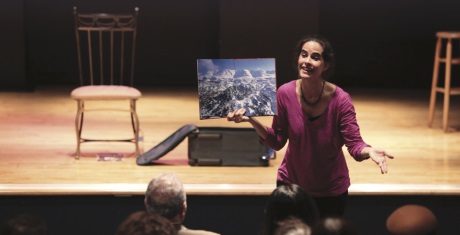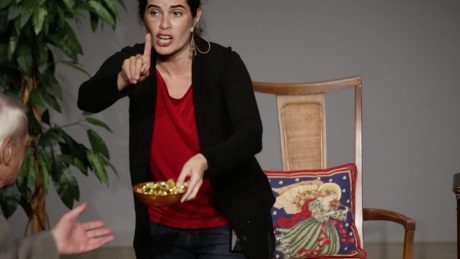In The Protean Self, Robert Jay Lifton explores the wonders of human resilience in times of profound disturbance and change.

In Hkeelee (Talk to Me), a theatrical memoir of sorts, writer and performer Leila Buck embodies that wonder, that resilience, and those dramatic changes through her real life relationship with her Teta, her Lebanese grandmother, Jeanne Lababidi.
The final production in Mosaic Theatre’s 2016 Voices from a Changing Middle East Festival, Hkeelee is being given a limited three-performance developmental run at the Kogod Cradle, at Arena Stage, the Mead Center for American Theater, April 30 and May 1, 2016.
I had the opportunity to talk with Leila Buck the other day about her new project and what she hopes to accomplish with the show and during this phase in its development.
What was evident from the onset of our talk was the richness of the relationship Ms. Buck has had with her grandparents, and with her grandmother in particular, a richness that has informed who she is as a person and as a performer.
The concept that “the personal is political” has been around since 1970 when Carol Hanisch’s paper was printed in Notes from the Second Year: Women’s Liberation.
In relation to Hkeelee, however, that notion takes on a uniquely powerful connotation.
Ms. Buck’s Teta was born in the mountains of Lebanon; she then moved to the international city of Beirut. Years later, during the 1975 war in Lebanon, Buck’s grandparents fled to the U.S., where they established a home in Washington, DC. (Buck’s mother, Hala Lababidi, also born and raised in Beirut, had left in 1968 when she married Buck’s father, Stephen, an American diplomat.)
When, in her later years, Leila’s Teta began to experience memory loss, and then dementia, the importance of her stories as well as the joy she took in telling them, magnified.
Those years inspired the creation of Hkeelee.
It is within that space created by memory loss and dementia, where time and place shift and conflate, in which the real and imagined interact in profound ways, that Hkeelee lives.
Thus the journey of Hkeelee is very much a storyteller’s journey, from the mountains of Lebanon to Washington’s monumental core to the heart and soul of Leila Buck herself, with each stop along the way issuing forth a new story and a new exuberance for life.
Even as Hkeelee chronicles the transformation in the lives of Ms. Buck’s grandparents, its focus is not so much on the events that shaped them, but on the new identities that emerged within them.
What was most evident from my short talk with Ms. Buck was that the show seeks to embody how those identities and their transformations shaped Ms. Buck herself: who she is and what she is becoming.

The challenge of Hkeelee is the challenge of making manifest that process of becoming, which comes not from an internal point of status, but from a dynamic interaction with the world around us.
Thus, Hkeelee is as much a one-woman show as it is an interactive theatre piece that requires audience engagement to give it shape and meaning.
Ms. Buck first began exploring Hkeelee on its feet in the Culture Project’s Women Center Stage festival 2013. She then had the chance to develop another version during her residency in summer 2014 in Beirut with the Zoukak Theatre Company. Since then she has performed work-in-progress readings in Spain, Canada, Tunisia, Lebanon, and Saudi Arabia.
Each setting changed the nature of the performance in significant ways, in much the same way changing circumstances re-create who we are or, more importantly, who her Teta was.
Now, to perform Hkeelee in Washington, her Teta’s “adopted” home, brings the project full circle.
We all know that stories are important, the stories that are told to us and the stories that we tell and live. Seldom, however, do we fully appreciate the profound impact that those stories have on what we think and believe.
Ms. Buck wants Hkeelee to spotlight the personal power of stories, but, as T. S. Eliot suggested, to also make those stories so personal that they touch upon the universal.
Through a type of “structured improvisation”, Ms. Buck invites audience members into the storytelling process, not just as listeners but as people at a dinner might respond to the family matriarch.
In this way, the audience becomes a part of the story not simply as voyeurs, but as active spectators whose participation is crucial to the final form and meaning of the performance itself.
Finally, let me say that, from the get-go, as I was writing this piece, I wanted to refer to Ms. Buck as “Leila”. The formality of journalism (not that I claim to be a journalist) dictated otherwise, as well as the fact that I only know Ms. Buck from my short conversation with her.
The intellectual and emotional honesty of that conversation, however, and our easy rapport, the kind that immediately breaks down the barriers of time and space and history and lets identities be transformed, left me feeling as if I knew “Leila”, if only in a small way.
In that same space, I imagine Hkeelee taking place, as it recreates the life of Ms. Buck’s Teta, as she enters the Kogod Cradle and shares her stories with us all.
Hkeelee plays April 30 and May 1, 2016, at Arena Stage’s Kogod Cradle, The Mead Center for American Theatre – 1101 6th Street, SW, in Washington, DC. For tickets go online.





